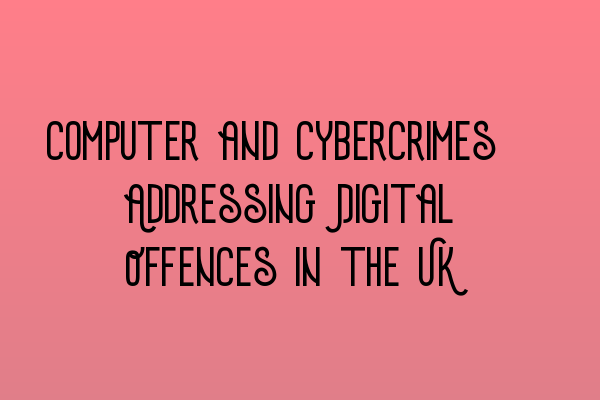Computer and Cybercrimes: Addressing Digital Offences in the UK
Welcome to the blog of SQE Criminal Law & Practice Law UK, where we discuss important topics related to criminal law and practice. In this post, we will delve into the world of computer and cybercrimes and explore their impact on society, as well as the legal measures taken to address these digital offences in the United Kingdom.
The Rise of Digital Offences
In today’s digital age, technology has become an integral part of our daily lives. While it has brought about numerous benefits and advancements, it has also created new avenues for criminal activities. Cybercrimes, such as hacking, identity theft, and online fraud, have become increasingly prevalent, posing significant threats to individuals, businesses, and even governments.
As the reliance on technology grows, so does the sophistication of cybercriminals. It is crucial for the legal system to keep pace with these developments and establish robust measures to combat digital offences effectively. This involves understanding the nature of the crimes, staying updated on emerging technologies, and implementing appropriate legislation and penalties.
Addressing Computer and Cybercrimes in the UK
The United Kingdom recognizes the seriousness of computer and cybercrimes and has implemented various legal frameworks and initiatives to tackle these offences. The Computer Misuse Act 1990, for instance, criminalizes unauthorized access, modification, or disruption of computer systems. This legislation provides law enforcement agencies with the necessary tools to investigate and prosecute those involved in cybercrimes.
Moreover, the UK government collaborates with international organizations, such as Interpol and Europol, to combat cybercrimes on a global scale. This cooperation allows for information sharing, joint investigations, and coordinated efforts to combat cybercriminal networks.
To enhance the legal sector’s readiness in addressing computer and cybercrimes, aspiring law professionals can pursue SQE 2 Preparation Courses, which provide comprehensive training on criminal law and practice, including the intricacies of digital offences. These courses equip individuals with the necessary knowledge and skills to navigate the complexities of cybercrime cases effectively.
Protecting Individuals and Businesses
The impact of computer and cybercrimes extends beyond financial losses. Individuals and businesses can suffer reputational damage, loss of confidential information, and even psychological harm. It is crucial for individuals and organizations to prioritize cybersecurity and implement proactive measures to protect themselves from digital threats.
Developing a strong cybersecurity culture involves educating employees about safe online practices, implementing robust data protection measures, and regularly updating security systems. Furthermore, seeking legal advice from experienced professionals can help individuals and businesses understand their rights and take appropriate legal action in the event of a cybercrime incident.
Conclusion
Computer and cybercrimes pose significant challenges to society, but the UK is actively addressing these digital offences through legislation, international collaboration, and legal education. Aspiring law professionals can benefit from SQE 1 Preparation Courses and SQE 1 Practice Exam Questions to gain a solid foundation in criminal law, which includes understanding the complexities of computer and cybercrimes.
Remember, staying vigilant in the digital realm and seeking legal assistance when necessary will help protect individuals and businesses against cybercriminals.
